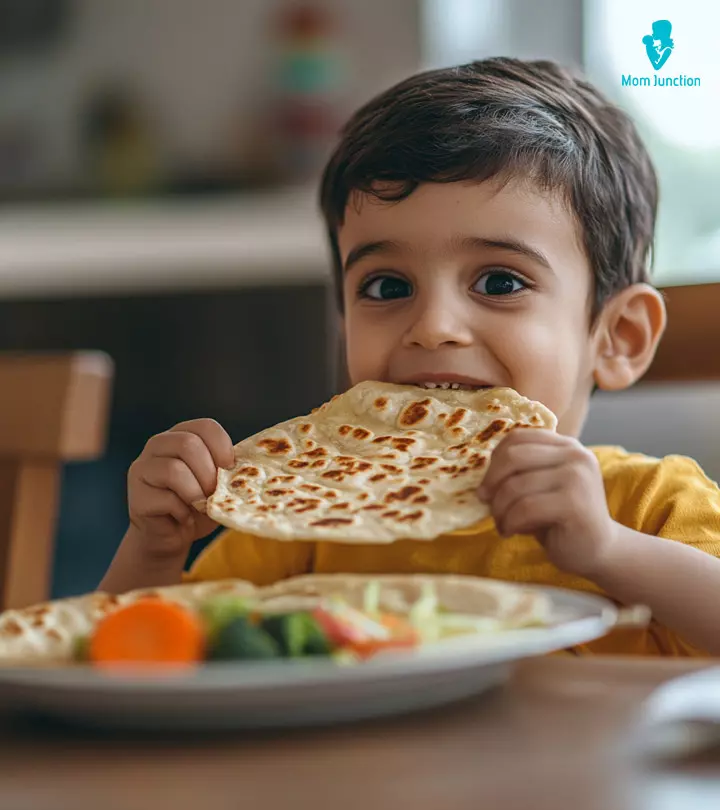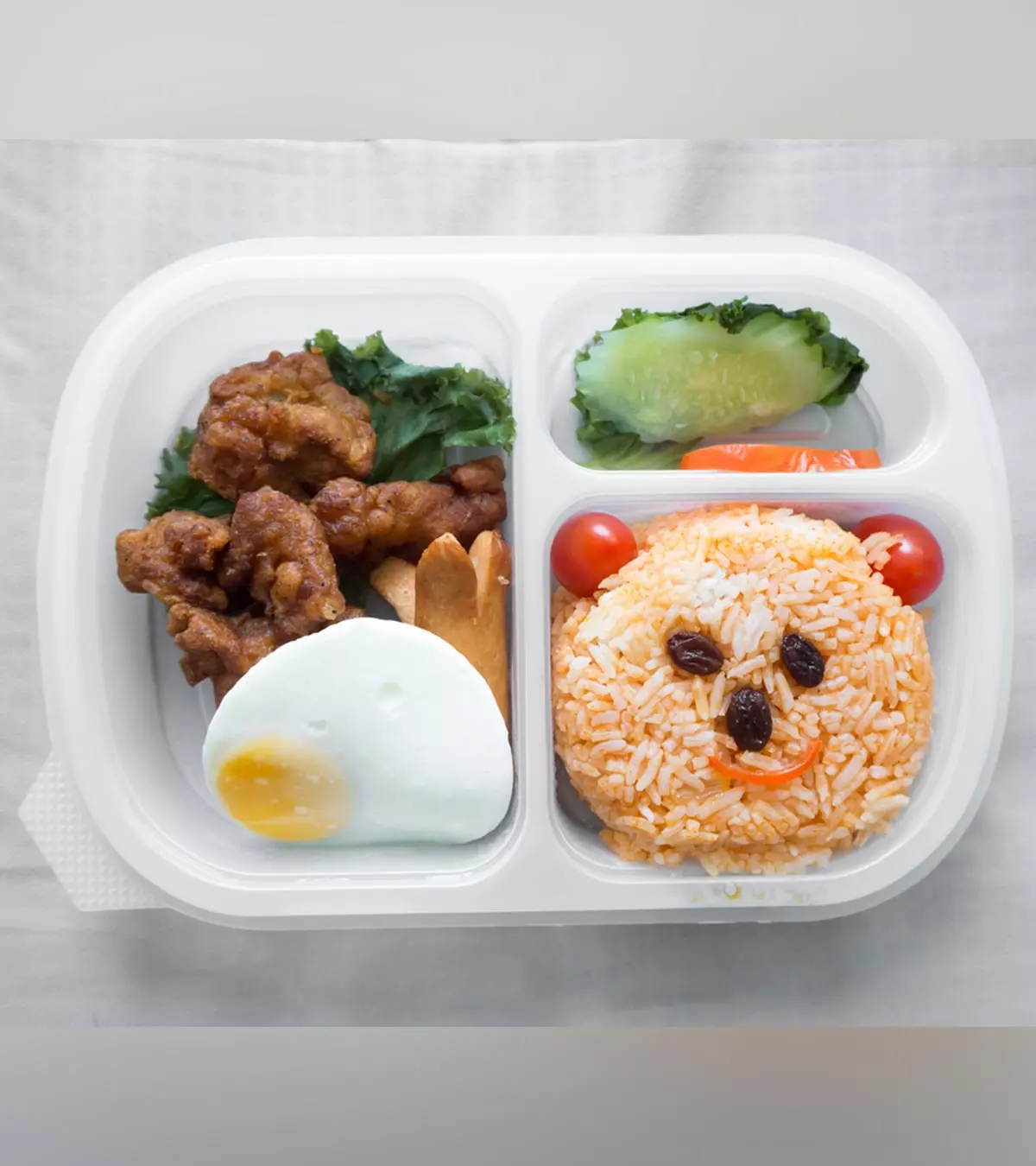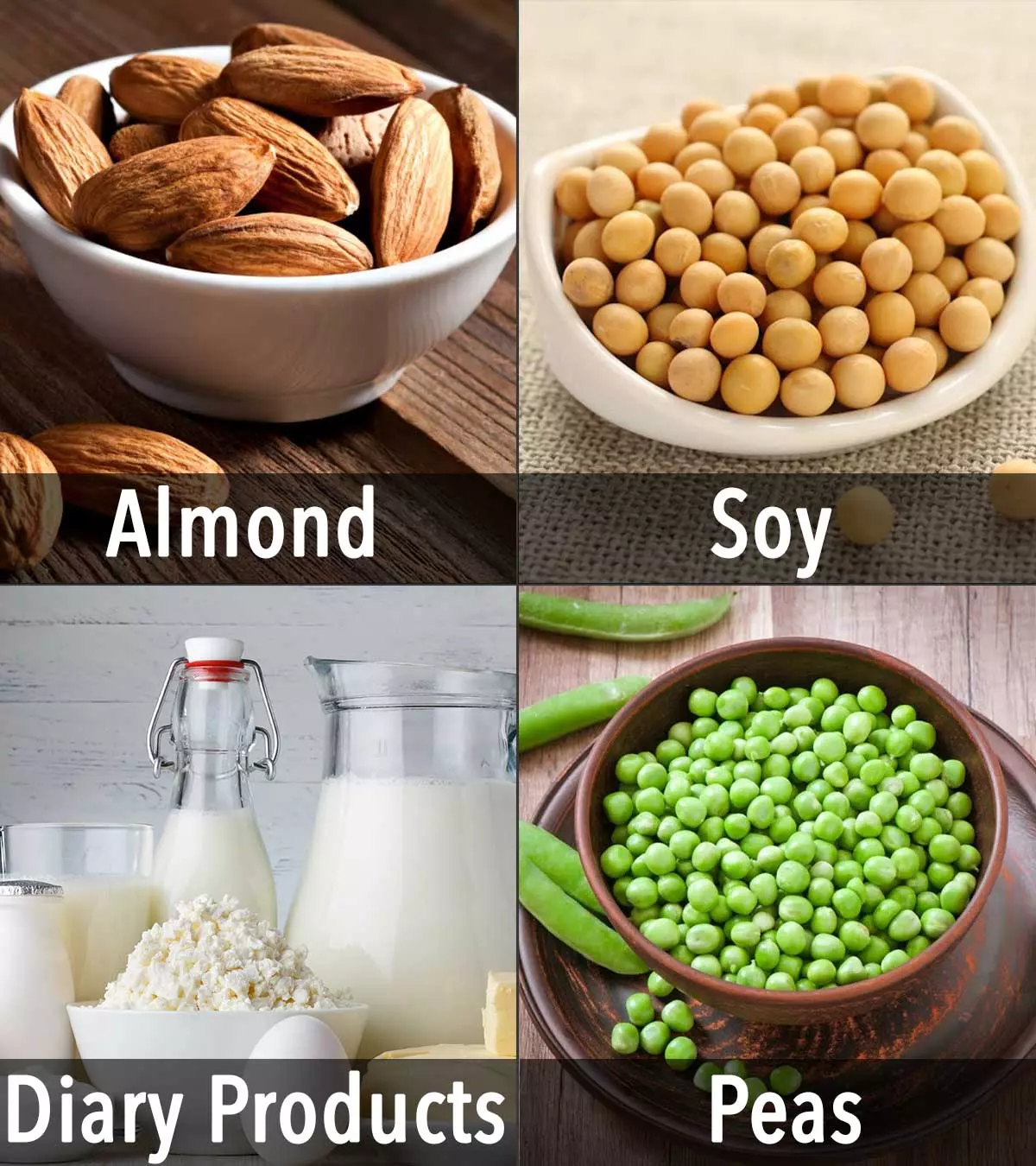
Image: Midjourney/ MomJunction Design Team
The benefits of eggs for kids are aplenty, and eggs are an excellent source of protein, iron, vitamins, and fats. But it should also be noted that you should refrain from giving too much egg to your little ones as it is a high source of protein and might adversely affect the kidneys if eaten in excess amounts. Too many eggs might also cause bloating and vomiting. Therefore, it is advised that children should have only about two eggs a day so that they may get other nutrients from different foods as well. Continue reading this post as we talk about the benefits of eggs for children and the ideal quantity for consumption.

Key Pointers
- Eggs are a good source of protein, vitamins (B12 and D), and iron and offer several health benefits for children.
- The AAP recommends that children avoid consuming raw or partially cooked eggs.
- Consumption of eggs can aid a child’s growth and development, improve vision and heart health, and help manage obesity.
- Eggs contain choline and omega 3 fatty acids, which play a vital role in children’s brain and cognitive development.
- Eggs are widely available, easy to prepare, and versatile, making them a great addition to various meals for children.
Nutritional Values Of An Egg For Kids
Eggs contain several essential nutrients and bioactive compounds that can promote overall health. Regular consumption of eggs can contribute to a child’s daily nutritional requirements. Here’s the nutritional composition of a large egg (50g) to help you understand its nutritional value (1):
| Nutrients | Amount |
|---|---|
| Energy | 80Kcal |
| Carbohydrates | 0.6g |
| Total Fat | 5.0 grams |
| Protein | 6.3g |
| Phosphorus, P | 99mg |
| Potassium, K | 69mg |
| Sodium | 63mg |
| Cholesterol | 213mg |
| Choline, total | 147mg |
Source: US Food And Drug Administration
How Many Eggs Should Your Kid Eat In A Day/Week?
There is no particular limit on the number of eggs a child can consume in a week, but it is generally believed that four eggs are ideal to ensure they get the required nutrients and to prevent the risk of high cholesterol due to excessive consumption. However, the American Academy of Pediatrics recommends giving one egg a day to toddlers in two servings, where one serving contains half an egg (14).
There is no harm in your child eating one egg a day. Feed eggs with a combination of delicious and healthy foods for kids to ensure they get all the nutrients, instead of overfeeding them with just one type of food.
Top 12 Health Benefits Of Eggs For Kids
The next time your child complains about eating eggs, you can list them the benefits of eggs given below (2) (3).
1. Supply protein
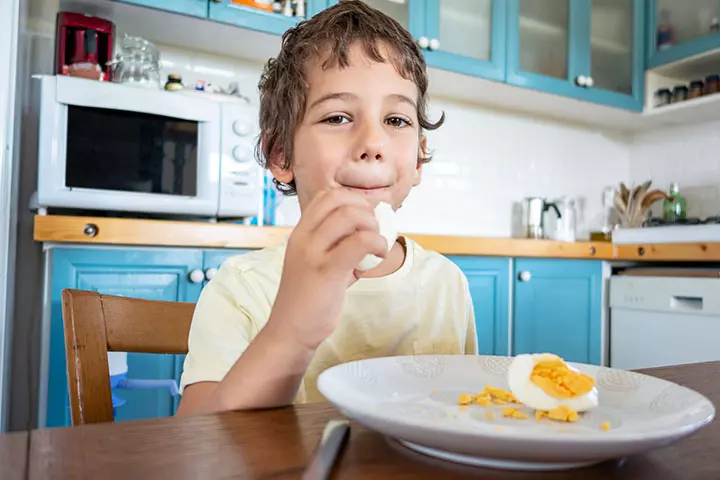
Eggs are a complete protein food. Each egg contains 6 grams of protein per serving.
- Proteins are the building blocks of a young body and are required for new cell generation and regeneration of cells. Eggs help kids grow bigger and stronger.
 Quick fact
Quick fact2. Eggs contain lutein and zeaxanthin
Based on the Centers for Disease Control and Prevention data, around 6.8% of children under 18 in the US have been diagnosed with eye and vision conditions (15). Eggs are an excellent source of lutein and zeaxanthin, which are essential for healthy eyes.
- They keep vision sharp and reduce the impact of macular degeneration.
- They also ensure the health of the retina.
3. Eggs contain choline
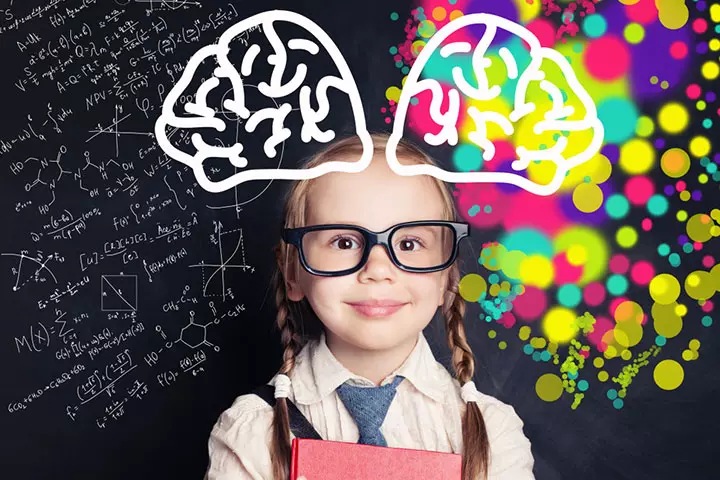
Choline helps in building the membranes of the cells.
- It is also important for the development of the brain.
- Choline is also responsible for the molecules of the brain that signal the nerves. 1 egg contains 100mcg of choline.
4. Eggs contain omega-3s
Omega 3 is a healthy fat found predominantly in fish. However, eggs laid by hens consuming a diet rich in algae, flaxseeds, and fish oil contain good amounts of omega-3 fats (4) (5).
- Omega 3 helps in early brain and cognitive memory development.
- It can lower triglycerides in the blood, reduce inflammation, and prevent the development of plaques in the arteries, promoting overall heart health.
5. Eggs are replete with vitamin-D

Eggs are an excellent source of vitamin D.
- Vitamin D is important for the bone health of growing kids.
- In addition to vitamin D, zinc, lutein, and zeaxanthin present in eggs contribute to bone health. They may also promote bone strength by supporting lean body mass.
- Research indicates that children who include eggs in their diet tend to have greater height and weight compared to those who do not consume eggs (6).
6. Eggs help in healthy hair and nails
Eggs contain essential amino acids, which help in the growth of healthy nails and hair.
- Kids are always chewing off their nails or breaking them and eggs ensure faster regrowth.
- You can also use eggs as a natural conditioner!
7. Complete balance of fats
Eggs contain the right balance of saturated and unsaturated fats which make it an excellent snack for growing bodies.
- We are fighting childhood obesity on a global scale and hence we can feed eggs to the kids without any worries about obesity.
- Try poached or boiled eggs, rather than fried ones!
Suggesting to avoid consuming extra fats when consuming eggs, Susan Campbell, RD, LD, a registered dietitian at the Cleveland Clinic, says, “When cooking eggs, you also want to stay away from adding additional animal fats like butter, bacon grease and lard because those have saturated fats in them, too. It’s better to use olive oil or some kind of plant-based oil instead, and you can jazz up egg whites without adding a lot of animal fat by sautéing them with vegetables, salsa or different herbs (16).”
8. Eggs have minimal cholesterol

Eggs have minimal harmful cholesterol. In fact, the consumption of eggs leads to a spike in HDL (good cholesterol).
- This is extremely important keeping in mind the global children obesity epidemic.
- You can prepare eggs with minimal fats, less oil, or boiled eggs to ensure that your kid receives adequate nutrition without the harmful effects. You may try feeding them eggs in the form of omelets with vegetables, scrambled eggs, pancakes, or eggs with runny yolk for breakfast. You may also pack these in their school lunch boxes.
Hard-boiled eggs are difficult to peel and may end up creating a mess. However, Ed Bruske from Columbia who has his kitchen garden shares a way to perfectly peel hard-boiled eggs. He writes, “All this time I’d had six eggs in 2 1/2 quarts of water (use a tall, rather than wide, pot–uncovered–for this) coming to a boil on the stove. As soon as it starts to boil, remove the pot, cover it and let the eggs sit for 17 minutes exactly. At the end of 17 minutes, transfer the eggs to a large bowl of iced water and put the pot back on the heat to return to a boil. Leave the eggs in the iced water for precisely 2 minutes. Remove them, and when the water on the stove comes back to a boil, plunge the eggs into the pot. Wait until the water again comes to a boil, count 10 seconds, then immediately remove the eggs, placing them back in the ice bath. They are now done (i).”
 Point to consider
Point to consider9. Eggs contain B12
Eggs are an excellent source of the B12 vitamin.
- Vit B12 is essential for neural health.
- This vitamin is also called cobalamin. It is important for your child’s brain and nervous system development.
10. Eggs contain folic acid

This water-soluble vitamin is equally essential for the neural health of kids.
- A folate deficiency can lead to weakness and nerve damage.
- So, it is essential to load up on eggs for the right dose of folic acids.
11. Contain less sugar
One medium-sized, raw egg weighing about 44 grams contains only 0.3 grams of carbohydrates and 5.5 grams of protein (1).
- Moderate consumption of eggs can help provide children with sustained energy without affecting their sugar levels.
- Besides, eggs contain several vitamins and trace minerals that help maintain overall health.
12. Keep children fuller for longer
Including eggs in a child’s meals can promote satiety. Research suggests that eggs can enhance metabolic activity and make children feel full for longer by (2):
- Elevating the hormones (ghrelin and leptin) that promote a sense of fullness
- Eggs are rich in high-quality protein, which takes longer to digest
- Prolonging the time food remains in the stomach
Can Kids Eat Raw Eggs?
The American Academy of Allergy, Asthma, and Immunology (AAAAI), the American College of Allergy, Asthma, and Immunology (ACAAI), and the Canadian Society of Allergy and Clinical Immunology (CSACI), together with the American Academy of Pediatrics (AAP), recommend avoiding giving raw or partially cooked eggs, or products containing raw eggs to children (17).” This is because raw eggs might contain harmful bacteria, such as Salmonella, which can cause food-borne illnesses.
Beth Czerwony, RD, LD, a registered dietitian at the Cleveland Clinic, says, “1 in 20,000 eggs has Salmonella, But you don’t want to be the person who eats that one egg.” However, he further shares, “If they’re in the shell or in cartons and they’re pasteurized, the USDA does say that raw eggs are safe. There are going to be some recipes where you need to use raw eggs. So, you want to use pasteurized eggs (18).”
How To Store Cooked Eggs?
Here’s how you can store hard-boiled eggs before and after removing their shell.
Storing unpeeled eggs
After boiling eggs, leaving the shells on is a good idea because they act like a shield. When you finish boiling them, put the eggs in a bowl of cold water to cool them down quickly. Once they’re cool, dry them well with paper towels. Make sure they’re not too wet. Put the eggs in an airtight container. If you only have a resealable bag, that’s okay, but a sturdy container is better to keep the shells whole. You can keep these unpeeled eggs in the fridge for up to a week. However, freezing the hard-boiled eggs with the shell is not recommended (19).
Storing peeled eggs
After boiling, cool the eggs in water, then peel them under running water. Place the peeled eggs in a bowl and cover them with enough cold water. Store the bowl uncovered in the fridge for two to three days. Change the water every day to keep it fresh. Remember, if you leave your eggs out for more than two hours, discard them to reduce the chances of food poisoning. Like unpeeled eggs, peeled hard-boiled eggs can be stored in the refrigerator for up to a week. Leftovers of dishes containing cooked eggs can only be stored in the refrigerator for up to 3-4 days (19).
Tips For Introducing Eggs To Picky Eaters
Here is how you may introduce eggs to your child’s diet if they are a picky eater.
- Offer small portions of eggs paired with their favorite foods, or incorporate eggs into familiar dishes such as sandwiches, pasta, and baked foods.
- Involve them in the meal preparation so that they get an idea of the number of ways an egg may be cooked.
- Try different cooking methods to change the texture of the egg to see which method they prefer best.
- Use different condiments such as marinades, sauces, herbs, or spices to change the color and taste of the egg.
- Encourage them to try out new food combinations with eggs by being a role model.
- Avoid using food as a reward for their behavior. Also, do not scare, punish, threaten, or bribe the child into eating what they don’t like.
Favorite Recipes With Eggs For Kids
Whether you are looking for egg recipes for toddlers or young children, we got you. Here are some delicious and healthy egg recipes you can feed your child as a part of a well-balanced, healthy diet.
1. Egg and grilled cheese sandwich
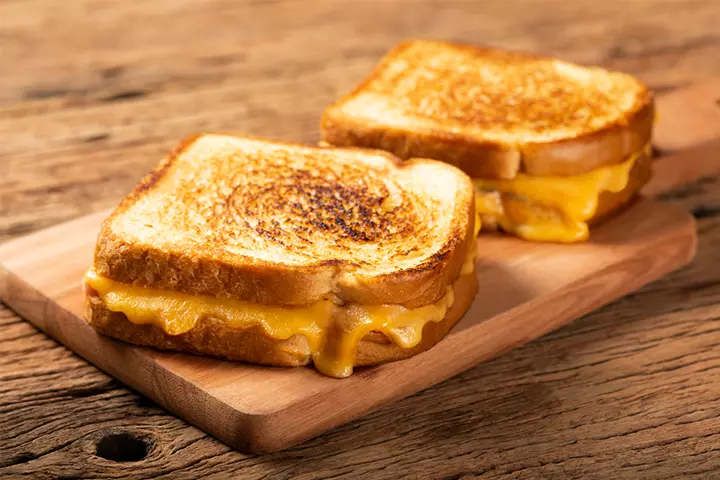
You will need
- 2 eggs
- 2 slices of bread
- 2 slices Colby jack cheese
- 1tbsp unsalted butter
- 1tbsp chopped onions
- 1tsp chopped chives
- Salt and black pepper, to taste
How to
- Place the grilling pan over low-medium heat. Add the butter to the pan and let it melt.
- Add eggs, chopped onion, salt, and pepper to a bowl and whisk until the mixture is light and foamy.
- Toast the bread slices in the skillet until one side is golden brown. Set them aside on a plate.
- Reduce the heat to low, and pour the eggs into the skillet. Cook the eggs without stirring until the edges begin to set. Fold eggs gently to cook evenly without browning.
- Just before the eggs are fully cooked, place the cheese slices on top of the eggs so that they melt.
- Now, place eggs on the slice of toasted bread, sprinkle with chives, and top with another slice of bread.
- Serve hot with a cup of milk or smoothie.
2. Waffle egg sandwich

You will need
- 2 frozen waffles
- 2 cheddar cheese slices
- 1 sausage patty
- 1 egg
- 1tsp milk
- 1tsp minced garlic
- Salt and pepper, to taste
- Mixed herbs, to taste
How to
- Take a microwave-safe plate. Set a sausage patty and a ramekin (or mug) next to each other on the plate.
- Crack an egg into the ramekin and whisk it for a few seconds.
- Add salt, pepper, mixed herbs, and milk. Whisk the egg mixture until the egg foams.
- Place the plate in the microwave and let the egg cook for two minutes, until it is cooked through.
- Once cooked, carefully flip the mug upside down to release the cooked egg onto the plate. You might need a knife to loosen the edges first.
- While the egg cooks, toast two frozen waffles.
- Place one waffle on the serving plate. Top it with cheese slices, the cooked sausage patty, and the cooked egg. Place the other waffle on top and sprinkle with some mixed herbs if desired.
- Serve warm with a cup of milk, homemade lemonade, or smoothie to complete the meal.
3. Egg bagel bites
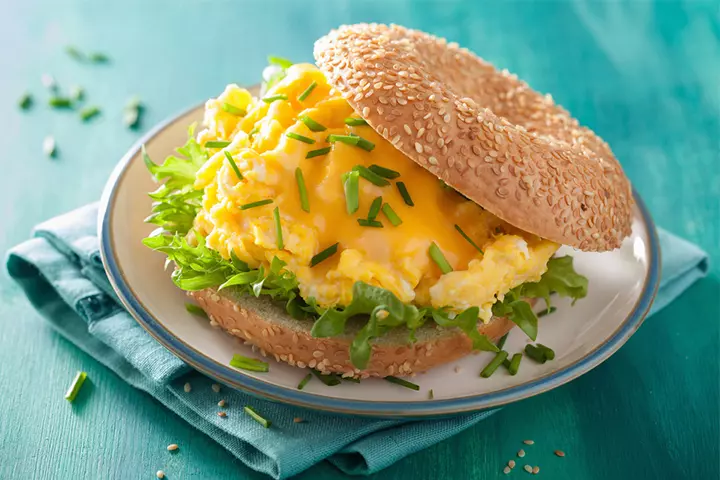
You will need
- 3 mini bagels (cut into halves)
- 3 large eggs
- 1 tomato, thinly sliced
- ¼ cup shredded cheese
- 1tbsp unsalted butter
- Lettuce leaves,
- Mixed herbs, to taste
- Oil
How to
- Preheat the oven to 350°F (176°C). Line a baking sheet with parchment paper and set it aside.
- Lightly spread the butter on the bagels and place them on the baking sheet.
- Put the baking sheet in the oven, and bake the bagels for about 15 minutes.
- Meanwhile, crack the eggs into a bowl and whisk them up until they are light and fluffy.
- Warm oil in a large skillet over low heat.
- Pour in the whisked eggs on the skillet and scramble them until they are cooked through.
- Take the baked bagels out of the oven and place them on a wire rack to cool.
- Now, put a bagel slice on the plate with the toasted side facing down. Layer it with a lettuce leaf, a tomato slice, and some scrambled eggs.
- Sprinkle the mixed herbs over the eggs, and put another bagel slice on top. Repeat the process with the remaining bagels.
- Put the bagels back in the oven for another ten minutes. Take them out and serve them hot with homemade dips.
4. Mini breakfast egg muffins

You will need
- 1 green bell pepper (chopped)
- 1 red bell pepper (chopped)
- 1 bunch green onions (chopped)
- 8 large eggs
- ½ pack shredded mild cheddar cheese
- ¼ cup whole milk
- 1 pinch onion powder
- 1 pinch garlic powder
- Salt and pepper, to taste
- Oil
How to
- Preheat the oven to 350°F (176°C). Lightly grease a muffin tin with oil and set it aside.
- Add eggs, chopped bell peppers, milk, garlic powder, onion powder, salt, and pepper in a large bowl. Sprinkle with shredded cheddar cheese and whisk everything together until it is well combined.
- Now, carefully pour the mixture evenly among the greased muffin cups.
- Put the muffin tin into the oven and bake the muffins for approximately 30 minutes. Check if they’re done by inserting a toothpick into the center of a muffin; if it comes out clean, they are ready.
- Take out the muffins from the oven and place them on a wire rack to cool.
- Serve warm with some homemade ketchup or dip.
Priscilla, a blogger and a mother of three, shares her egg muffin recipe and how she introduced the recipe to her kids. She says, “Lately lil man (her youngest son) seems to be bored of his food, so had to make more food to entice him. Bookmarked a similar recipe but lazy to follow so came up with my anyhow easy method. Jus a quick chop chop ingredients which u can prep the night before and jus put into muffin tray and pour egg over to bake while u get the kids ready for school or urself for work! I added chopped ham, tomatoes, crabstick, spinach. I grease the muffin tray with oil and scoop ingredients inside. No exact measurement as I just put them by ‘feel’.. Hahaha, ya by feel for this morning. Think ingredients can be anything that yourself or your family likes. I beat 6 eggs and added seasonings to it. Pour over ingredients til 80% or just covering the ingredients…The big kids love it. So it will be an alternative to their lunchboxes for school (ii).”
Frequently Asked Questions
1. At what age can I give eggs to my child?
It is advised that you start including eggs in your child’s diet after they are about six months of age (7).
2. Do eggs fight memory loss in children?
Eggs are a rich source of choline, which is known to nurture brain functions and memory skills. Therefore, they may be considered to help reduce the risks of memory loss (8).
3. What are some alternative protein sources if my child doesn’t like eggs?
Pulses, quinoa, soya beans and its products, cereals, nuts, seeds, lean meat, dairy products, and fish are some of the various protein sources a child can consume if they can’t eat eggs (9).
4. Can eating eggs improve a child’s immunity?
Eggs are one of the most affordable sources of protein and calcium for kids. Consuming one egg per day helps in the proper development of your child’s brain and cognitive memory. It also aids in strengthening their bones and muscles. However, eggs should be consumed in moderation to avoid the risk of high cholesterol. Therefore, give your child an appropriate amount of eggs to help them get their full benefits. You should also include other fruits and vegetables for kids to make a balanced diet.
Infographic: Egg Recipes For A Wholesome Breakfast
An egg is undoubtedly one of the most nutritious foods for children due to its vast nutritional content of vitamins, minerals, protein, and calories. So let your child get the required strength and energy for the day by feeding them tasty egg breakfasts with these easy recipes. Illustration: Momjunction Design Team
Illustration: Benefits Of Eating Eggs For Kids And Its Nutritional Value
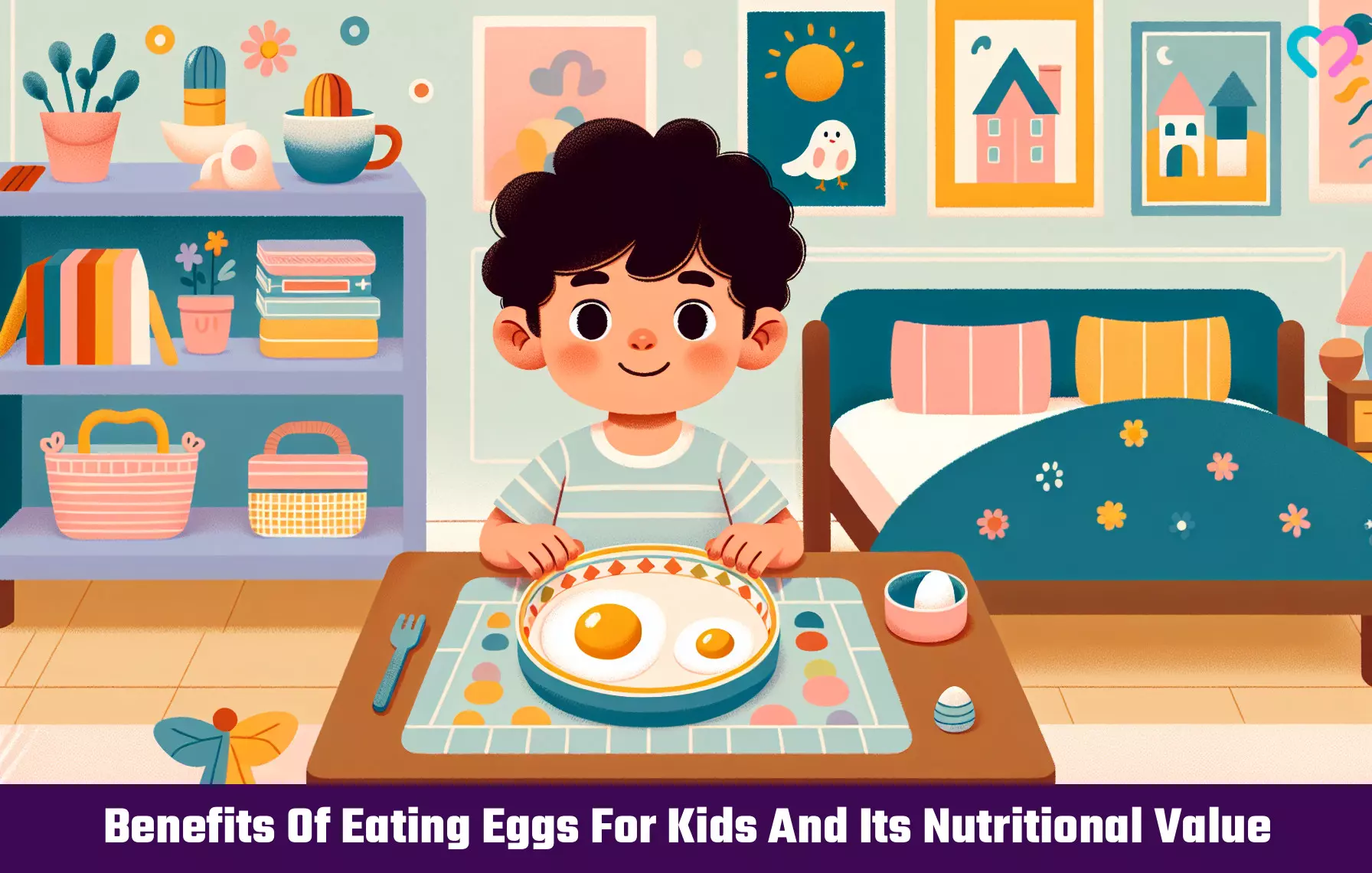
Image: Dalle E/MomJunction Design Team
Personal Experience: Source
MomJunction articles include first-hand experiences to provide you with better insights through real-life narratives. Here are the sources of personal accounts referenced in this article.
i. Kids Make Perfect Deviled Eggs;https://theslowcook.blogspot.com/2008/02/kids-make-perfect-devlied-eggs.html
ii. Egg Muffin;https://priscillarecipes.blogspot.com/2017/08/egg-muffin.html
References
- Egg, Whole, Raw, Fresh.
https://fdc.nal.usda.gov/fdc-app.html#/food-details/171287/nutrients - The Health Benefits of Eggs.
https://www.australianeggs.org.au/nutrition/health-benefits - Are Eggs Good for Your Health or Not
https://www.uhhospitals.org/blog/articles/2025/04/are-eggs-good-for-your-health-or-not - Organic? Omega 3? Free-Range? All You Need to Know About Eggs.
https://columbiasurgery.org/news/2017/05/12/organic-omega-3-free-range-all-you-need-know-about-eggs - Omega-3 Fatty Acids.
https://ods.od.nih.gov/factsheets/Omega3FattyAcids-HealthProfessional/ - Coheley, L. M., et al.; (2018); Whole Egg Consumption and Cortical Bone in Healthy Children.
https://www.ncbi.nlm.nih.gov/pmc/articles/PMC6604058/ - Eggs for Babies and Children, Australian Eggs.
https://www.australianeggs.org.au/nutrition/babies-and-children - Best Foods for a Healthy Brain, NorthWestern Medicine.
https://www.nm.org/healthbeat/healthy-tips/nutrition/best-food-for-a-healthy-brain - How to get protein without the meat; British Heart Foundation
https://www.bhf.org.uk/informationsupport/heart-matters-magazine/nutrition/protein/how-to-get-protein-without-the-meat# - Are eggs good for you or not?
https://www.heart.org/en/news/2018/08/15/are-eggs-good-for-you-or-not - Batiha, Gaber El-Saber, et al.; (2025); Dairy-Derived and Egg White Proteins in Enhancing Immune System Against COVID-19.
https://www.frontiersin.org/journals/nutrition/articles/10.3389/fnut.2025.629440/full - Joshua L. Hudson, et al.; (2025); Dietary Protein Requirements in Children: Methods for Consideration.
https://www.ncbi.nlm.nih.gov/pmc/articles/PMC8147948/ - What About Cholesterol, Eggs and Kids?
https://www.chla.org/blog/advice-experts/what-about-cholesterol-eggs-and-kids - Serving Sizes for Toddlers.
https://www.healthychildren.org/English/ages-stages/toddler/nutrition/Pages/serving-sizes-for-toddlers.aspx - Fast Facts: Vision Loss.
https://www.cdc.gov/vision-health/data-research/vision-loss-facts/ - Is It Safe To Eat Eggs Every Day?
https://health.clevelandclinic.org/can-you-eat-eggs-every-day - Elissa M. Abrams et al.; (2025); Updates in Food Allergy Prevention in Children.
https://publications.aap.org/pediatrics/article/152/5/e2023062836/194356/Updates-in-Food-Allergy-Prevention-in-Children - Is Eating Raw Eggs Bad?
https://health.clevelandclinic.org/can-you-eat-raw-eggs - What You Need to Know About Egg Safety.
https://www.fda.gov/food/buy-store-serve-safe-food/what-you-need-know-about-egg-safety
Community Experiences
Join the conversation and become a part of our nurturing community! Share your stories, experiences, and insights to connect with fellow parents.
Read full bio of Dr. Prakhar Nyati
Read full bio of Sindusha MS
Read full bio of Swati Patwal
Read full bio of Shinta Liz Sunny










